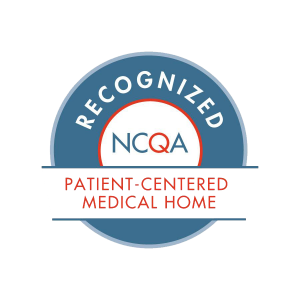
Working with you to give you the best medical care possible.
Anticoagulation and anti-platelet medications
Anticoagulation medications, or blood thinners, are medications used to decrease the ability of blood to clot. They are used to stop blood clots from enlarging and to stop formation of new clots. They are used in medical conditions where a blood clot has formed and further blood clot formation needs to be prevented or in conditions where people are at risk of forming blood clots which could lead to serious complications. Blood thinners can be taken in pill form, by injection or through an intravenous line. Atrial fibrillation (a fib) is one of the conditions for which anticoagulation is used. A fib keeps the heart from pumping effectively allowing blood to pool in the upper chambers where a clot may form, break loose and cause a stroke.
Another condition for which anticoagulation is used is DVT, or deep venous thrombosis, in which clots form in veins. Those blood clots can break off and go to lung arteries, a condition called pulmonary embolism, causing blocked blood flow to lung tissue, which can be a life-threatening condition.
Blood thinners are also used in the setting of acute coronary syndromes where blood flow to arteries that supply heart muscle is blocked.
Conditions treated with Anticoagulation Medications:
- Prevention of deep venous thrombosis
- Treatment of deep venous thrombosis
- Prevention of stroke in atrial fibrillation
- Cardiac settings
For more information regarding atrial fibrillation refer to these web sites:
www.stopafib.org
What Is Atrial Fibrillation?
Atrial Fibrillation_MedlinePlus
For more information regarding pulmonary embolism refer to these web sites:
What is Pulmonary Embolism?
Mayo Clinic
Oral Anticoagulation Medication
Long-term anticoagulation is usually provided with the oral medication, warfarin, brand name Coumadin, or with the recently approved Pradaxa (dabigatran) or Xarelto (rivaroxaban). Blood test monitoring is important when on warfarin to minimize risk of excessive anticoagulation which can result in bleeding. Possible symptoms or signs of bleeding include easy bruising, blood in urine or stool, headaches or confusion.
When first starting warfarin, blood tests will need to be performed frequently, more than once weekly, but later lab monitoring often may be reduced to monthly. When on warfarin, one must be careful of one’s diet because certain foods can influence warfarin’s blood-clotting effect. For more information on diet and warfarin, see:
Warfarin Diet: What Food Should I Avoid?
One must also be careful of possible drug interactions with warfarin. For additional information about warfarin including drug interactions, possible adverse effects and concerning symptoms to watch out for, see:
Patient and Consumers – Blood Thinner Pills
The new medications Pradaxa and Xarelto just became available in 2011 for anticoagulation for atrial fibrillation. They don’t require the frequent blood test monitoring required with warfarin use, but their cost is significantly higher than warfarin. Injectable anticoagulants include Lovenox (enoxaparin), Fragmin (dalteparin), Arixtra (fondaparinux) and heparin. They are typically used short-term while waiting for an oral anticoagulant such as warfarin to take effect.
Aspirin
Aspirin is also used for stroke prevention in atrial fibrillation though studies suggest it’s less effective than warfarin.
Aspirin has known benefit in preventing first heart attack (myocardial infarction) in men and first ischemic stroke in women, but it does have the side effect of increasing risk of gastrointestinal bleeding. For more info, see:
Daily Aspirin Therapy: Understand the Benefits and Risks
Plavix is used for prevention of heart attacks and strokes in patients with recent coronary events, recent strokes or known peripheral arterial disease.. For more information, see:
Plavix Drug Info_Mayo Clinic
Aggrenox is used for prevention of thrombotic stroke in patients who have had prior thrombotic stroke or TIA (transient ischemic attack). For more information, see:
Aggrenox Drug Info_Mayo Clinic
A potential adverse effect of anticoagulants and antiplatelet medications is bleeding. If you are taking one of these medication, please contact your provider if you note red or brown urine, black or tarry stools, blood in vomit, coughed-up blood, unusual bruising, or severe pain such as headache or abdominal pain.


